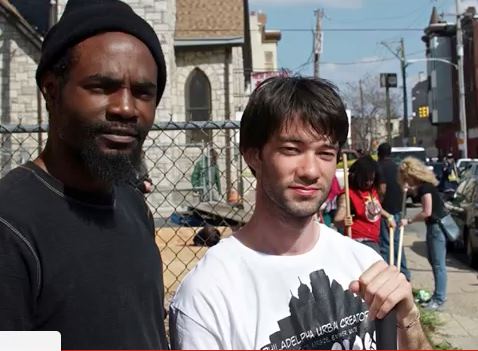
As Alex Epstein walked to class at Temple, he noticed the landscape was dotted with vacant lots that glistened with sprinkles of broken glass and garbage. But instead of ignoring the debris, he used it as inspiration for a challenge. To make his goals a reality, Epstein teamed up with likeminded Philadelphians to create change through a program called Philly Urban Creators.
As a precursor to his work in Philadelphia, Epstein gained experience in urban revitalization and community rebuilding while working in New Orleans’ Lower Ninth Ward after the devastation of Hurricane Katrina.
“In the very beginning, many of the people who founded PUC met by going on a series of trips to New Orleans,” Epstein said. “We rode in 15-passenger vans for 27 hours down to New Orleans, spent a week living on cots turning empty lots into farms in the Lower Ninth Ward, learning what people were doing down there to survive.”
Epstein said he saw what he and others did in New Orleans as something that could be done in their own backyard.
“We came back and figured, ‘Why couldn’t we do the same thing?’” Epstein said. “We’re younger, but why not us? And then we met a whole bunch of people who are key to the group, founded the organization and have been doing it ever since.”
With hours of hands-on experience under his belt, Epstein had the means to start making change in his own North Philly community.
“The Urban Creators started with a really weird combination of individuals living in North Philly,” Epstein said. “We had some residents of North Philly and some students that go to Temple. We just started this team and started taking over vacant lots, turning them into urban farms and gardens.”
The group is partnered with people from all over Philadelphia, and even outside of Pennsylvania, to spread awareness and teach kids about urban farming and revitalization. It has gardens in plots located on Dauphin and York streets, 11th and Dakota streets and 15th and Diamond streets. Group members also build greenhouses throughout the city upon request.
Coming from New York City, Epstein said he saw North Philly as somewhere he could make a real difference.
Epstein will graduate in May as an interdisciplinary major – meaning he nearly created his own major – where he studies sociology, environmental design, urban education and business.
“Everyone told me to not walk off the campus at Temple because it’s too dangerous, it’s filled with crime, violence, trash and whatever, but I just went,” Epstein said. “I didn’t think it was cool to be in a community for five years and never talk to your neighbors. So I just went out and started talking to people, met the crew and we’ve been family ever since.”
Devon Bailey, a resident of North Philadelphia who joined Epstein and the rest of the PUC crew, described why the area is a prime location for their work.
“It’s a food desert,” Bailey said. “If we can make our model work there, we can show that our model will work everywhere. It’s a good testing ground for what we do. So far, it’s working.”
Epstein and his team are focusing on Philadelphia for now, but they have plans to grow as an organization.
“Right now we have the Philly branch, we also have a New York City branch, where we have one farm in Far Rockaway and three school gardens in Manhattan,” Epstein said. “At this point, we plan to use the model we use in North Philly so that people from any town or city can come to us and learn what we do and go home and do the same thing.”
The organization also holds educational programs for schools and universities, and it sells food to restaurants downtown to raise funds for other projects.
From humble beginnings raising funds through parties at Temple and using the money to invest in the organization’s growth, the group now holds more upscale fundraisers in larger locations such as Underground Arts, where it held an “activist dance party” on Feb. 1. Through this growth, group members said they hope to become financially stable on the production side of things and create jobs for members of the community to create more growth in North Philly.
“If we can provide jobs for people in the neighborhoods, that’s just less problems for everyone,” Bailey said. “If you can provide jobs, you bring the crime rate down. I think that’s one of the tools that people need to use, and it works.”
Brendan Menapace can be reached at BSMenapace@temple.edu.



Be the first to comment